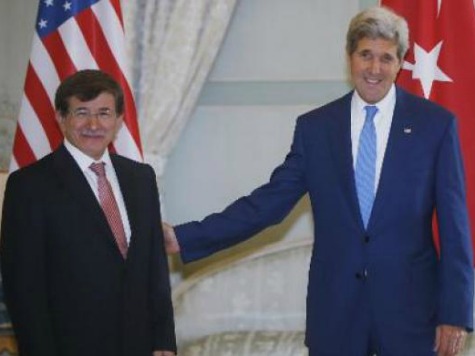Turkish Prime Minister Ahmet Davutoglu told CNN’s Christiane Amanpour this week that Turkey was open to putting boots on the ground in Syria, but only if “we can be sure that our border can be protected,” to which he later added, “We don’t want the regime anymore against our border.”
Speaking to Amanpour, Davutoglu responded to the question of whether Turkish ground troops were the only “plausible” option to fighting the Islamic State terrorist group in Syria. Considering the difficulties the Syrian army, led by President Bashar al-Assad, have faced given resistance from a number of other groups not officially affiliated with that jihadist sect, the need for ground troops–which President Obama has categorically refused to deploy–may fall on Turkey’s shoulders.
While Davutoglu did not contend the need for such troops, he added an important caveat to Turkey’s employing ground forces in Syria. “We are ready to do everything if there is a clear strategy that, after ISIS, we can be sure that our border can be protected,” he explained. “We don’t want the regime anymore against our border. … We don’t want other terrorist organizations to be active there.”
Later in the interview, Davutoglu added that Turkey was concerned about the focus on the Islamic State, rather than a holistic approach to eradicating terrorism in Syria. “We shouldn’t be separating pre-ISIS and post-ISIS Syria,” he explained. “If ISIS goes, another radical organization may come in, so our approach should be comprehensive, inclusive, strategic and combined.” He concluded that the international community must strive to “eliminate all terrorist threats in the future, and also to eliminate all brutal crimes against humanity committed by the regime,” which was a clear attack on Assad.
According to English-language Turkish outlet Hurriyet Daily News, Davutoglu added that, for ground troops to enter the war on ISIS, he would also like to see “a no-fly zone and safe havens inside Syria.”
Turkey, a NATO member nation, has received significant criticism for its role in the expansion of the Islamic State in Syria and Iraq. In late September, Turkish President Tayyip Erdogan promised Turkey would provide “military or logistics” assistance in the fight against the Islamic State, but has yet to significantly deliver on any aid to the fight. Turkey did not participate in airstrikes against the Islamic State nor allowed use of its airspace in the first round of attacks on Syrian Islamic State strongholds. It has since chosen to join the alliance of nations working against ISIS.
While Turkey dithers on the possibility of sending ground troops, Kobane, one of the most pivotal strategic Kurdish towns on the border, is close to falling into the hands of the Islamic State. Erdogan himself has warned that the town may be 24 hours away from a complete takeover, while doing apparently nothing to prevent it from happening. In the rest of eastern Turkey, the Islamic State has all but eliminated the border between Syria and Turkey. More than 300 towns on the Turkish-Syrian border– 92%–have fallen under Islamic State rule, and ISIS jihadists routinely cross the border to sell oil stolen from Iraqi and Syrian oil fields, receive medical care, or, as one jihadist claimed, get general support from Sunni people in the towns.

COMMENTS
Please let us know if you're having issues with commenting.